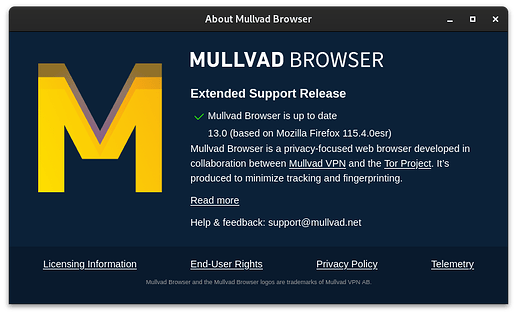I would not trust a one-man-show. For teh same reason PaleMoon is gone from my Computers. Nice product, but driven by one person? No thx.
Not sure if EFF can be trusted or not but my Ms. Edge result is that it has “Strong” protection against web tracking.
Did you ever get around to try Mercury Browser? If you did, would you mind sharing your experience?
I just saw Chris Titus being quite enthusiastic about another of Alex313031’s projects, namely Thorium Browser:
Watch on Piped: The Best Web Browser
Sorry for the late reply, I’ve been on vacation for the past two weeks ![]()
It seems like we’re lucky on Arch systems as all you have to do to install it is a simple yay mercury-browser-bin. Install was a breeze which is nice compared to the hoops you have to jump through on Ubuntu and Fedora. The differences between this and plain Firefox aren’t really apparent from the get go. It does seem to perform a bit better speed wise (although this may just be my perception) which is nice and most of the default garbage that Firefox usually pushes is turned off. You can usually just do that with profiles anyway but I guess this could save you some time. Overall it’s not that different from the rest from a privacy perspective but it does have some potential for future growth. Kudos to the developer!
Here is a list of a few of the patches that it offers:
- Compiler adjustments include AVX, AES, LTO, and PGO.
- Turn off all telemetry and reporting.
- Disable all debugging elements and activate hardening by default.
- Default settings include backspace for navigation and GPU acceleration.
- Activate the Do Not Track feature and enable Global Privacy Control.
- Turn off Pocket, highlights, and suggested content on the new tab page.
- Bring back the top bar to its ~ESR78 state, including the home button and developer button.
- Permit the installation of extensions that are not signed.
Usually I would recommend any firefox based tele-stripped browser, but atm I would suggest going for an chromium based stripped down browser, until mozilla has fixed this:
Hi @chikenf00t and thanks for taking your time to reply and sharing your findings!
Hope you have had a nice vacation.
Also in the meantime, after reading your post, I also downloaded the zip file to have a look.
It is possible to run the binary, as a portable app so it is not necessary to install it if one doesn’t want so.
Perhaps it is practical to do so in the distros you mentioned.
I haven’t “played” with it enough yet to check it all up but i’ll be keeping an eye on the project as I am interested on the Chromium for (Thorium) as well.
Thanks again!
![]()
A “non scientific” comparison between Chromium and Ungoogled Chromium as to where they connect to upon launching and running a couple of minutes.
Both browsers run on default settings. Chromium is installed from Arch’s repo and UGC is the flatpak version.
The linkt to Web Store in UGC is a “phoney link”.
Also the pings done by NetworkManager seem to be normal but I don’t know why they are done.
People working on “ungoogling” Chromium seems to have done a pretty good job.
You are right, that is normal. By the way, it’s not an actual ping (as in ICMP echo request), they just put “ping” in the URL (probably because it is used for a ping-like function).
In any case, it’s a connectivity check NetworkManager does, see here: https://wiki.archlinux.org/title/NetworkManager#Checking_connectivity. The stock package out of the Arch repo is configured to use ping.archlinux.org for the check but you can change it to use a different webserver if you’d like, or shut it off altogether.
Thanks for the reply and the explanation@BluishHumility! And for the link!
Sorry for not having done my “homework” ![]()
This browser and Thorium are on my “watch list”. I’ve already played around with Thorium a bit. Both projects show promise but I want to see how they grow over time.
The problem with Thorium is the fact that the base is not ungoogled chromium but plain chromium. So privacy wise its really bad (imo).
I get that, but, in my case, it’s hard to “un-google” myself overall. That said, I should take a look at ungoogled chromium.
I only say that because the topic revolve around privacy ![]()
Its one thing to use google services and its another to use they’re browser directly because they collect even more data on you and that also allows them to collect data where they couldn’t otherwise.
Fair. I understand getting extensions working in ungoogled chromium is a bit of a pain but, I’ll take a look.
This Github page seems to have a solution though… https://github.com/NeverDecaf/chromium-web-store
I use this in UGC. Works just fine.
After playing around with this for the past few weeks, I’m also coming to the conclusion that hardening Firefox yourself is the best option overall. You can do whatever the “security enhanced” versions do, and you’re first in line for the latest updates.
I guess the main thing I get from all this is that ‘hardened’ Firefox is still the best bet - and I use it some of the time.
However, I have used Brave for a couple of years now (on less mission critical sites mostly), and despite all the stories of how bad they ‘must’ be, consequences (such as unwanted ads, msgs, phishes etc) have been entirely absent. I don’t use the wallet functions at all though, and I don’t miss them!
On a side note - there is lots of chatter out there that PIA is terrible because of some past choices be some of the team. Aren’t they allowed to learn? Same as Brave - no bad consequences after multiple years of use.
I can’t just be lucky, right?
Firefox is ![]()
Well…yeah…those things are not really the issue with Brave so that isn’t surprising.
I have not seen any credible evidence that demonstrates that Brave has learned anything except how to better market itself.
To be totally clear, I don’t really think there is anything wrong with using Brave as a regular browser. If what you are worried about is blocking ads or something similar, it is fine. However, if you are looking for Privacy protection, Brave isn’t it despite their claims.
The PIA situation isn’t really about “past choices” by the team. They have been and still are engaged in some seriously questionable business practices. They are part of Kape Technologies/Crossrider since 2019. Kape has don’t some anti-consumer things over the years and have demonstrated pretty clearly that they shouldn’t be trusted.
The VPN business is pretty nasty overall. Many of the providers are either outright paying the “reviewers” for ranking or have some type of referral revenue scheme with them. However, this bad behavior wasn’t enough for Kape. They actually acquired a bunch of VPN review sites and then moved all the VPN providers they own to the top of the lists on those sites.
In general, I think mistakes can be forgiven but a pattern of deliberate bad activities should not be. Just because a company has not been caught recently doesn’t mean they are now worthy of trust.




